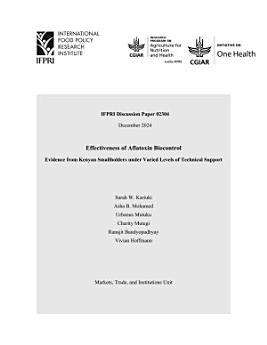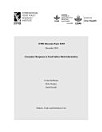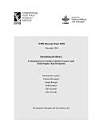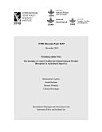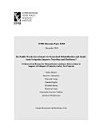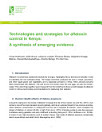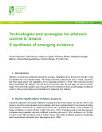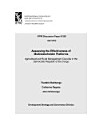Effectiveness of aflatoxin biocontrol: Evidence from Kenyan smallholders under varied levels of technical support
Kariuki, Sarah W. · Mohamed, Asha B. · Mutuku, Urbanus · Mutegi, Charity · Bandyopadhyay, Ranajit · Hoffmann, Vivian
Oca 2025 · IFPRI Discussion Papers Kitap 2304 · Intl Food Policy Res Inst
E-kitap
37
Sayfa
family_home
Uygun
info
reportPuanlar ve yorumlar doğrulanmaz Daha Fazla Bilgi
Bu e-kitap hakkında
Agricultural technologies shown to be highly effective in research trials often have a lower impact when utilized by smallholder farmers. Both heterogeneous returns and suboptimal application are believed to play a role in this efficacy gap. We provide experimental evidence on the impact of a biocontrol product for the control of aflatoxin, a carcinogenic fungal byproduct, as applied by smallholder farmers in Kenya. By varying the level of external support across farmers, we investigate the role of misapplication in the effectiveness gap. We find that the provision of biocontrol together with a one-time training on application reduces aflatoxin contamination in maize relative to a control group by 34 percent. Additional training to the farmers in the form of a call to remind them of the correct time of application in the crop cycle increases the reduction to 52 percent. Our findings indicate that farmers can achieve meaningful improvements in food safety using biocontrol even with minimal training on its use and that additional support at the recommended time of application can strengthen its impact.
Bu e-kitaba puan verin
Düşüncelerinizi bizimle paylaşın.
Okuma bilgileri
Akıllı telefonlar ve tabletler
Android ve iPad/iPhone için Google Play Kitaplar uygulamasını yükleyin. Bu uygulama, hesabınızla otomatik olarak senkronize olur ve nerede olursanız olun çevrimiçi veya çevrimdışı olarak okumanıza olanak sağlar.
Dizüstü bilgisayarlar ve masaüstü bilgisayarlar
Bilgisayarınızın web tarayıcısını kullanarak Google Play'de satın alınan sesli kitapları dinleyebilirsiniz.
e-Okuyucular ve diğer cihazlar
Kobo eReader gibi e-mürekkep cihazlarında okumak için dosyayı indirip cihazınıza aktarmanız gerekir. Dosyaları desteklenen e-kitap okuyuculara aktarmak için lütfen ayrıntılı Yardım Merkezi talimatlarını uygulayın.
